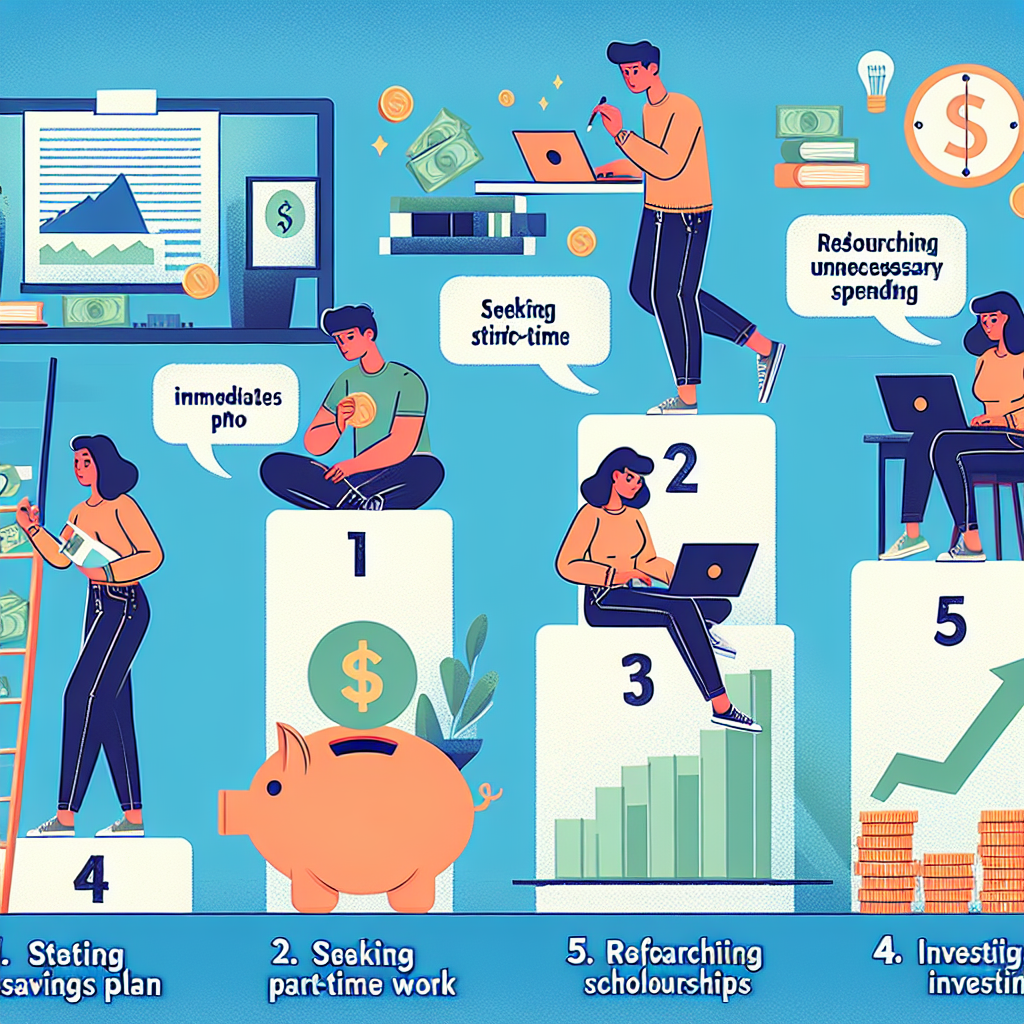-
Table of Contents
- 5 Immediate Steps College Students Can Take to Accelerate Financial Freedom
- 1. Understand Different Types of Mortgage Loans
- 2. Build and Maintain a Strong Credit Score
- 3. Start Saving Early
- 4. Educate Yourself on Financial Literacy
- 5. Make Smart Investment Decisions
- Frequently Asked Questions (FAQ)
- What is the best type of mortgage loan for first-time homebuyers?
- How can I improve my credit score quickly?
- What is compound interest, and why is it important?
- How much should I save each month?
- Is it better to invest in stocks or real estate?
- Conclusion
“`html
5 Immediate Steps College Students Can Take to Accelerate Financial Freedom

As a college student, achieving financial freedom might seem like a distant dream. However, taking the right steps early on can set you on a path to financial independence much sooner than you might think. In this article, we will explore five actionable steps that college students can take to accelerate their journey towards financial freedom. From understanding different types of mortgage loans to making smart financial decisions, these tips will help you build a solid financial foundation.
1. Understand Different Types of Mortgage Loans
One of the first steps towards financial freedom is understanding the various mortgage loans available. This knowledge will be invaluable when the time comes to purchase your first home. Here are some common types of mortgage loans:
- Fixed-Rate Mortgages: These loans have a consistent interest rate throughout the loan term, making them predictable and stable.
- Adjustable-Rate Mortgages (ARMs): These loans have interest rates that can change periodically, often starting with a lower rate that increases over time.
- FHA Loans: Backed by the Federal Housing Administration, these loans are designed for first-time homebuyers and those with lower credit scores.
- VA Loans: Available to veterans and active-duty military personnel, these loans offer favorable terms and often require no down payment.
- USDA Loans: These loans are aimed at rural homebuyers and offer low interest rates and no down payment options.
2. Build and Maintain a Strong Credit Score
Your credit score plays a crucial role in your financial future, affecting everything from loan approvals to interest rates. Here are some tips to build and maintain a strong credit score:
- Pay Bills on Time: Consistently paying your bills on time is one of the most important factors in maintaining a good credit score.
- Keep Credit Card Balances Low: High credit card balances can negatively impact your credit score. Aim to keep your balances below 30% of your credit limit.
- Avoid Opening Too Many Accounts: Each new credit account can lower your average account age, which can hurt your credit score.
- Monitor Your Credit Report: Regularly check your credit report for errors and dispute any inaccuracies you find.
3. Start Saving Early
Saving money early in life can have a significant impact on your financial future. Here are some strategies to help you start saving:
- Create a Budget: A budget helps you track your income and expenses, making it easier to save money.
- Open a Savings Account: A dedicated savings account can help you set aside money for future goals.
- Automate Savings: Set up automatic transfers to your savings account to ensure you save consistently.
- Take Advantage of Compound Interest: The earlier you start saving, the more you can benefit from compound interest, which can significantly grow your savings over time.
4. Educate Yourself on Financial Literacy
Financial literacy is the foundation of financial freedom. The more you know about managing money, the better equipped you’ll be to make smart financial decisions. Here are some ways to improve your financial literacy:
- Read Books and Articles: There are countless resources available that cover various aspects of personal finance.
- Take Online Courses: Many websites offer free or low-cost courses on financial topics.
- Attend Workshops and Seminars: Look for local events that focus on financial education.
- Follow Financial Experts: Follow reputable financial experts on social media and subscribe to their newsletters for ongoing tips and advice.
5. Make Smart Investment Decisions
Investing is a key component of building wealth and achieving financial freedom. Here are some tips for making smart investment decisions:
- Start Small: You don’t need a lot of money to start investing. Many platforms allow you to invest with small amounts.
- Diversify Your Portfolio: Spread your investments across different asset classes to reduce risk.
- Invest for the Long Term: Focus on long-term growth rather than short-term gains.
- Seek Professional Advice: Consider consulting with a financial advisor to help you create an investment strategy that aligns with your goals.
Frequently Asked Questions (FAQ)
What is the best type of mortgage loan for first-time homebuyers?
FHA loans are often a good option for first-time homebuyers due to their lower credit score requirements and smaller down payment options.
How can I improve my credit score quickly?
Paying off outstanding debts, making timely payments, and correcting any errors on your credit report can help improve your credit score quickly.
What is compound interest, and why is it important?
Compound interest is the interest on a loan or deposit calculated based on both the initial principal and the accumulated interest from previous periods. It’s important because it can significantly grow your savings over time.
How much should I save each month?
A common recommendation is to save at least 20% of your income each month. However, the exact amount can vary based on your financial goals and circumstances.
Is it better to invest in stocks or real estate?
Both stocks and real estate have their pros and cons. Stocks can offer higher returns but come with higher risk, while real estate can provide steady income and long-term appreciation. Diversifying your investments across both can be a good strategy.
Conclusion
Achieving financial freedom as a college student may seem challenging, but by taking these immediate steps, you can set yourself on the right path. Understanding different types of mortgage loans, building a strong credit score, saving early, educating yourself on financial literacy, and making smart investment decisions are all crucial components of financial success. Start implementing these strategies today, and you’ll be well on your way to financial independence.
If you’re ready to take the next step towards financial freedom, consider reaching out to a correspondent lender in our network for personalized advice and mortgage options tailored to your needs.
“`








